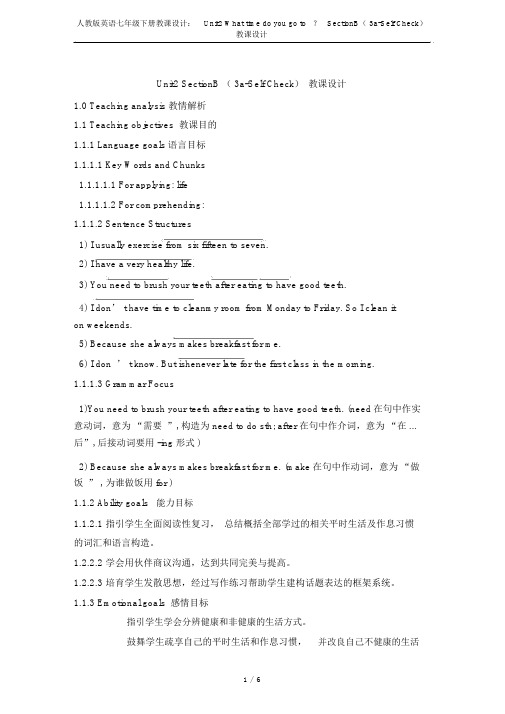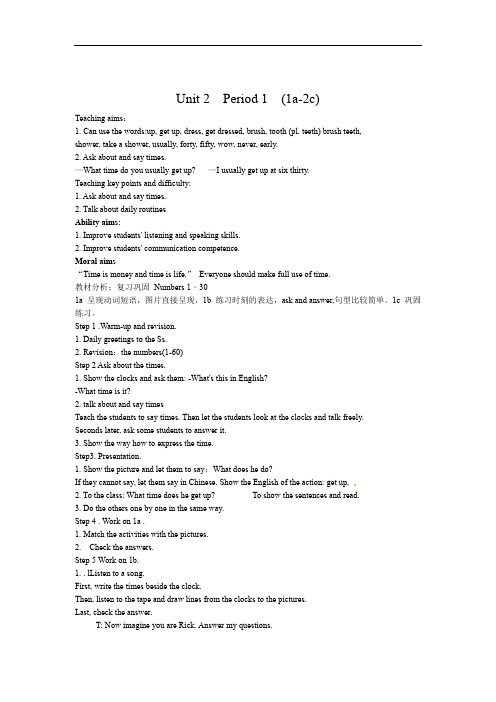Unit学导案Whattimedoyougotoschool
Unit2Whattimedoyougotoschool单元语法点加练习-人教版七年级英语下册

③在实义动词之前:We often go there .我们常去那儿。
④sometimes ,often可位于句首、句中或句末。
SometimesIwalk to school ; sometimesIgo to school by bike.
You should take a shower before going to bed.你睡前应该洗澡。
【要点拓展】
take+名词的短语
take a walk散步take a rest休息一下take a trip旅行take a look看一看
take a bath洗澡take a seat坐下take a break休息一下take a vacation度假
我有时步行去上学,有时骑自行车去上学。
2.难点突破
(1)频率大小
always>usually>often>sometimes>hardly ever>never
(2)对频率副词或频率短语提问用how often“多久(一次)”。
How often does he go swimming?他多久游一次泳?
A. in B. at C. on D. of
10. The boy is always ______me a hand wheneverIam in trouble .
A. give B. giving C. to give D. gave
二、句型转换。
1.Mr .Smithusuallygoes to workat7:00.(对画线部分提问)
英语七年级下册Unit2Whattimedoyougotoschool七下Uni

school at…. 正确:He gets up at half past five. He runs at six. He eats breakfast at seven. He
goes to school at…. 2. 句子语序受到中文的影响。 比如: 他是早上6点起床。 He in the morning at six gets up. 正确:He gets up at six in the morning. 3. 动词没有体现三单现。 He get up at…. He run at…. 正确:He gets up at…. He runs at….
After the class, I will be able to
1. read and learn about the daily routines of Tony and Mary.
2. understand healthy and unhealthy habits mentioned in the passage.
(完整版)人教版英语七年级下册教案:Unit2Whattimedoyougoto?Secti

人教版英语七年级下册教课设计: Unit2 What time do you go to ? SectionB( 3a-Self Check)教课设计Unit2 SectionB ( 3a-Self Check)教课设计1.0 Teaching analysis 教情解析1.1 Teaching objectives 教课目的1.1.1 Language goals 语言目标1.1.1.1 Key Words and Chunks1.1.1.1.1 For applying: life1.1.1.1.2 For comprehending:1.1.1.2 Sentence Structures1)I usually exercise from six fifteen to seven.2)I have a very healthy life.3)You need to brush your teeth after eating to have good teeth.4)I don’ t have time to cleanmy room from Monday to Friday. So I clean iton weekends.5)Because she always makes breakfast for me.6)I don ’ t know. But ishenever late for the first class in the morning.1.1.1.3 Grammar Focus1)You need to brush your teeth after eating to have good teeth. (need在句中作实意动词,意为“需要”,构造为 need to do sth; after 在句中作介词,意为“在 ...后”,后接动词要用 -ing 形式 )2) Because she always makes breakfast for me. (make在句中作动词,意为“做饭” , 为谁做饭用 for )1.1.2 Ability goals能力目标1.1.2.1 指引学生全面阅读性复习,总结概括全部学过的相关平时生活及作息习惯的词汇和语言构造。
七年级英语下册Unit2Whattimedoyougotoschool总结(重点)超详细(带答案)

七年级英语下册Unit2Whattimedoyougotoschool总结(重点)超详细单选题1、—What does he _________? Can you _________ me?—Sorry, I don’t know.A.say; tellB.speak; talkC.speak; tellD.say; talk答案:A句意:——他说什么?你能告诉我吗?——对不起,我不知道。
考查动词辨析。
say说,后接说的内容;tell告诉;speak说,后接语种;talk谈话。
根据“What does he...”可知,问说了什么内容,因此空一用say;根据“Can you...me?”可知,问他说的话能不能告诉我,空二用tell。
故选C。
2、—Can you come here at a quarter ________ ten?—Yes, I can be there at 9:45 .A.pastB.toC.afterD.before答案:B句意:——你能在九点四十五到这儿来吗?——是的,我可以在9:45到那里。
考查介词辨析。
past超过;to到;after在……之后;before在……之前。
根据“a quarter…ten”和“9:45”可知,此处指九点四十五,即距十点差一刻钟,使用介词to。
故选B。
3、For lunch, she eats___________ fruit and vegetables.A.a lotB.anyC.lots ofD.much答案:C句意:午餐,她吃很多水果和蔬菜。
考查形容词辨析。
a lot非常,修饰动词;any一些,任何,用于否定句或一般疑问句;lots of一些,后接可数或不可数名词;much一些,后接不可数名词。
句子为肯定句,且空后是名词,所以排除选项A和B;根据空后vegetables是可数名词可排除选项D。
故选C。
4、—Would you like some Wenchang Chicken? It delicious.—Yes, please.It’s my favorite.A.soundsB.tastesC.feels答案:B句意:——你要文昌鸡吗?可口。
人教版七年级英语上Unit 11 What time do you go to school?Section A课件

box.
two
one
two
Rick has __t_w_o___ brothers
(1)
and __t_w_o__ sisters. Rick’s
(2)
Family has __o_n_e__
(3)
Shower.
2b Listen again and complete this shower schedule for Rick’s family.
1b Listen and match the times and actions. Draw lines from the clocks to the pictures.
1c Pairwork
One student is Rick. The other is the interviewer. Ask and answer questions about Rick’s day.
run
eat breakfast
take a shower
Section A
Unit 11
What time do you go to school ?
1a
Match the words and the pictures.
1. go to school _a___ 2. get up __d___ 3. run ___b___ 4. eat breakfast _e__ 5. take a shower__c_
Time
Name
5:00
Bob
6:பைடு நூலகம்0
Mary
7:00
Jerry
8:00
Alicia
Look at the chart below. Write a short passage about your day.
unitwhattimedoyougotoschool全单元教案

Unit 2 Period 1 (1a-2c)Teaching aims:1. Can use the words:up, get up, dress, get dressed, brush, tooth (pl. teeth) brush teeth,shower, take a shower, usually, forty, fifty, wow, never, early.2. Ask about and say times.—What time do you usually get up? —I usually get up at six thirty.Teaching key points and difficulty:1. Ask about and say times.2. Talk about daily routinesAbility aims:1. Improve students' listening and speaking skills.2. Improve students' communication competence.Moral aims“Time is money and time is life.”Everyone should make full use of time.教材分析:复习巩固Numbers 1–301a 呈现动词短语,图片直接呈现,1b 练习时刻的表达,ask and answer,句型比较简单。
1c 巩固练习。
Step 1 .Warm-up and revision.1. Daily greetings to the Ss.2. Revision:the numbers(1-60)Step 2 Ask about the times.1. Show the clocks and ask them: -What's this in English?-What time is it?2. talk about and say timesTeach the students to say times. Then let the students look at the clocks and talk freely.Seconds later, ask some students to answer it.3. Show the way how to express the time.Step3. Presentation.1. Show the picture and let them to say;What does he do?If they cannot say, let them say in Chinese. Show the English of the action: get up,2. To the class: What time does he get up? To show the sentences and read.3. Do the others one by one in the same way.Step 4 . Work on 1a .1. Match the activities with the pictures.2. Check the answers.Step 5 Work on 1b.1. . lListen to a song.First, write the times beside the clock.Then, listen to the tape and draw lines from the clocks to the pictures.Last, check the answer.T: Now imagine you are Rick. Answer my questions.T: What time do you usually get up?S: I usually …at …1 / 12Step 6. Work on 1c .1. Student A is the interviewer. Student B is Rick. Ask and answer questions about Rick'sday.-What time does Rick usually get up?-He usually gets up at….2. Have some pairs present their conversations to the class.Step 7 Work on 2a & 2b1. T: Please turn to page 8.2. T: Now let's listen to the conversation and complete the sentences.3. T: Can you get the answers? Please check the answers.4. T: Please look at 2b. I'll play the conversation once again. Complete the shower schedulefor Jim's family.5. T: What time does Bob take a shower? S: He usually takes a shower at 5:30.【教案设计说明】此环节进一步巩固了本堂课所学的词汇和句型。
初中英语人教版七年级下册《Unit 1 What time do you go toschool S
go to work radio show
at eleven from twelve o’clock at night
to six o’clock in the morning
Presentation listen and fill in the blanks
Interviewer: Scott has an interestijnobg _____. He workrsadaitoast_a_t_io_n______. What time is your radio show? Scott: _F_r_o_m__ twelve o’clock at ntioght __ six o’clock in the morning. Interviewer:W_h__a_t_t_im__e_ do you usually get up? Scott:A_t__ eight thirty at night. Then I eat breakaftansinte________. Interviewer: That’s a funny tifmore _______ breakfast! Scott: Yeah.A_f_te_r__ that, I usually exercaitse __ about ten twenty. Interviewer: W__h_e_n____ do you go to work? Scott: At eleven o’clock, so I’m nevefrorlate ______ work.
My brother John is _in__t_e_r_e_s_t_e__d_in English.
Presentation Language points
2. job与work 辨析 job是可数名词, 主要指有酬劳的工作 work是不可数名词, 主要指要付出努力 的劳动 鲍勃想找一份好的工作。 Bob wants to find a goojdob____.
新目标版英语七年级下册Unit2Whattimedoyougotoschool?(SectionA)含答案
新目标版英语七年级下册Unit 2 What time do you go to school?(Section A)一、根据句意及首字母提示完成句子1、根据句意及首字母提示完成句子(1)Tom is very young. He can't get d________ by himself(他自己).(2)Jim is seven years old. He can b________ his teeth in the morning.(3)—What's ten and thirty?—It's f________.(4)I always get up e________. I never get up late.(5)There are many(许多的)buses(公共汽车)at the bus s________.二、用所给词的适当形式填空2、用所给词的适当形式填空(1)—What time do you usually________ (eat) breakfast?—At seven thirty.(2)“That's a ________ (fun) time for breakfast.(3)________ (Lily) family has a cat. It's very interesting.(4)Jim usually ________ (do) his homework after school.(5)He ________ (brush) his teeth after he gets up every morning.三、从方框中选择合适的单词并用其正确形式完成句子3、从方框中选择合适的单词并用其正确形式完成句子(1)What do you ________ do on Sundays?(2)I ________ walk to school when it's sunny.(3)My father gets up early every day, so he is ________ late for work.(4)The sun(太阳) ________ rises(升起) in the east(东方) and sets in the west.(5)Tina finds a good ________. She ________ very hard (努力地) every day.(6)Mary wants to be a singer. She thinks it's an interesting ________.四、单选题4、Li Ming is the best student in our class. He __________ gets good grades(成绩).A、alwaysB、sometimes(有时)C、neverD、often5、Cathy was born blind(天生是盲的), so she has __________ seen our beautiful world.A、oftenB、sometimesC、seldom(很少)D、never6、My father, Mr. White, often __________ at six twenty in the morning.A、get upB、go upC、gets upD、go to bed7、Kate takes a shower at 8 o'clock in the evening.(替换画线部分)A、playsB、lovesC、hasD、brings8、—Do you like this movie?—Yes, it's the __________ one I've ever seen(曾经看过的).A、betterB、bestC、goodD、well9、—When do you go to school?—We go to school __________ Monday __________ Friday.A、on; toB、from, toC、in; andD、in, to10、Could I have an early morning call __________ six o'clock tomorrow(明天) ?A、onB、toC、atD、in11、The child doesn't need any help. He is old enough to __________ himself.A、put onB、wearC、dressD、take care12、__________ your father __________ watching TV in the evening?A、Does, likesB、Does, likeC、Is; LikesD、Do, likes13、Susan __________ her homework at school every weekend.A、don'tB、don't doC、doesn'tD、doesn't do五、按要求改写句子14、按要求改写句子(1)He wants to know about my weekend.(改为一般疑问句并作否定回答)________ he ________ to know about your weekend?No, he ________.(2)She goes to school at seven thirty.(改为否定句)She ________ ________to school at seven thirty.(3)She often has dinner at half past six in the evening(对画线部分提问)________ ________ does she often have dinner in the evening?(4)I take a shower at 8:00 in the morning.(对画线部分提问)________ ________ you ________ a shower in the morning?(5)I usually learn English at eight on the radio.(用he代替I改写句子)He ________ ________ English at eight on the radio.六、根据汉语完成句子15、根据汉语完成句子(1)—你几点钟锻炼?—我通常五点五十锻炼。
七年级英语下册Unit2Whattimedoyougotoschool重点知识归纳(带答案)
七年级英语下册Unit2Whattimedoyougotoschool重点知识归纳单选题1、Victor has a relaxing ________. He doesn’t have a lot of ________ and he only ________ on weekends. A.work; works; worksB.work; work; workC.job; work; worksD.job; works; work答案:C句意:维克多有一份轻松的工作。
他没有很多工作,他只在周末工作。
考查词汇辨析。
job工作,可数名词;work工作,不可数名词或动词。
根据“a relaxing ...”可知第一空用可数名词单数job;再由“a lot of”可知第二空用可数名词复数形式jobs或不可数名词work;根据“he only ... on weekends”可知第三空是个谓语动词,he后用work的第三人称单数形式works。
故选C。
2、My father is a good doctor. __________works hard to help his patients.A.HeB.HimC.HisD.Himself答案:A句意:我爸爸是个好医生。
他努力帮助病人。
A. He他,主格;B. Him他,宾格;C. His他的,形容词性物主代词;D. Himself他自己,反身代词。
此处缺少主语,应该用代词的主格形式,故答案为A。
点睛:人称代词分为主格和宾格,主格用作主语,宾格用作宾语。
如:He is a teacher.(主格) Let me help you.(宾格);物主代词分为形容词性物主代词和名词性物主代词,形容词性物主代词用作定语,修饰名词,如my book, his father(形容词性物主代词)。
名词性物主代词=形容词性物主代词+名词。
3、Sam is _______ late for school. He’s always the first to get to school. A.oftenB.alwaysC.neverD.usually答案:C试题分析:Sam从来上学也未迟到,他总是第一个到学校。
七年级下册unit2Whattimedoyougotoschool知识点讲解及练习
1.What time do you get up?释:这是一个由疑问词what time〔几点〕引导的特殊问句。
其构造:What time +助动词do/does +主语+动词原形,询问*人做*事的具体时间。
例如:what time do you begin class in the morning?你们早晨几点开课?注:What’s the time=What time is it?也是用来询问时间,意为“几点了〞。
用it作答。
例如:What’s the time? It’s 7:30.几点了?七点半了。
2.I usually get up at five o’clock. 我通常在五点钟起床。
释:1〕句中usually与often 一样都是频度副词,常用于动词be 之后,行为动词之前。
always意思是“总是〞、“永远〞,表示动作重复,状态继续,中间没有连续,通常用来修饰动词的一般时态。
例如:We always get up before si* o'clock.我们总是六点前起床。
假设修饰动词进展时,则有“老是〞,“再三地〞的意思,带有厌烦、不满、赞美等感情色彩。
例如:You are always ing late.你老是迟到。
〔含有责备的意思〕 He is always thinking of others.他总是想着别人。
usually(75%)意为“通常〞,着重表示已习惯的动作。
反义词为:unusually。
例如:They usually have four classes in the morning.他们上午通常上四节课。
They usually do some shopping on Sunday.他们通常星期天买东西。
often(50%)意为“时常〞、“经常〞,表示常常这样,但不总是这样,反义词为: seldom。
例如:She often helps her mother with her housework after school.放学后她常常帮助母亲做家务。
- 1、下载文档前请自行甄别文档内容的完整性,平台不提供额外的编辑、内容补充、找答案等附加服务。
- 2、"仅部分预览"的文档,不可在线预览部分如存在完整性等问题,可反馈申请退款(可完整预览的文档不适用该条件!)。
- 3、如文档侵犯您的权益,请联系客服反馈,我们会尽快为您处理(人工客服工作时间:9:00-18:30)。
Unit 2 What time do you go to school ? 一、 英汉互译 时间shower 通常 工作小时刷;刷子 牙 after 听do homeworkwish 星期六what time 回家 起床 到达 上床睡觉brush one’s teeth 淋浴、洗澡 二、重点句子讲解1. -What time do you usually get up, Rick?- I usually get up at five o’clock. 瑞克,你通常几点起床?我通常在五点起床。点拨:这是询问什么时间做某事的常用句型,它是由特殊疑问词what+time+助动词do/does+主语+谓语动词原形+其他?构成。它经常用来询问的时间(具体/抽象)。 例如: 我通常在12点吃午饭。短语what time的意思是,它和when是同义词,都是对进行提问,但what time所问的时间范围比较(大/小),一般用来提问比较精确的时间,回答的时候一般用具体到几点。而when所问的时间范围比较(大/小),回答的时候可以用几点钟,也可以是上午或者下午,甚至是哪一天、哪一年。 【考例】-______ does your father go to work every day? - He goes to work at half past six.A. How B. What C. What time D. How time2. -What time is it now?- It’s about six-fourteen.现在几点了?大约六点十四分。点拨:这是询问时间的常用句型,它的意思是。 询问时间还可以用: ; 【考例】- What time is it now? -It’s about ___.A. two second B. third fifteenC. five half D. four twelve3. I usually get up at five o’clock.我通常五点起床。点拨:介词at意为“在……”,既可以用来表示时间,有可以用来表示方位。 拓展介词in, on, at 的区别 【考例】-What time do you usually go to bed?-____ nine o’clock.A. At B. On C. In4. What a funny time to have breakfast!吃早饭的时间是多么有趣呀!点拨1:这是一个感叹句,是由what+冠词+形容词+名词+主语+谓语+其他!构成的感叹句。what在本句子的意思是“多么的”,经常用在感叹句中。 特殊疑问词how也引导感叹句,但是它的句型是:How+形容词+主语+谓语+其他!how的后面只能用形容词或者副词,不能用名词。 点拨2:1)funny 形容词,意为“有趣的,可笑的,滑稽的,奇怪的”;意为“有趣”时,相当于“interesting”。 2)fun 是funny的名词形式,意为“乐趣,娱乐,嬉戏,有趣的事”。常用于词组“have a fun (玩得开心)”。 【考例】-______ fine weather it is today!A. What a B. How aC. What D. How5. To get to work, he takes the No. 17 bus to a hotel. 为了上班,他乘坐第17路公共汽车到旅馆。点拨1:句子中的to get to work是动词不定式短语,在本句子中作目的状语,动词不定式作目的状语经常放在句子的后面,如果放在句子的前面用逗号隔开。 点拨2:第几路公共汽车的表达方式。 点拨3:1)work不及物动词,意为,第三人称单数是;worker是名词,意为,复数是。 2)work 名词,意为,是不可数名词,但表示一份工作可以用。 常用于以下词组:失业/下岗下班后去上班 3)work 名词,意为“著作,作品”,是可数名词,复数为。 【考例1】-______ bus should I take if I want to go to the cinema? -No. 15 bus.A. Which B. How C. How many D. Where 【考例2】______ her mother happy, she always gets good marks in the exams.A. to make B. To make C. Made D. Makes6. Can you think what his job is? 你能猜测到他是做什么工作的吗?点拨:本句子是含有宾语从句的复合句,宾语从句通常用陈述语序。 【考例】Our teacher told us that the earth ___ around the sun.A. wentB. goesC. going D. was going 7. I usually do my homework at around six-thirty in the evening.我通常在晚上六点半左右做家庭作业。点拨1:do one’s homework的意思是。短语中的one’s可以用名词所有格或者物主代词。 点拨2:around 在此处作副词,相当于about,意思是“大约”。 【考例1】______ Mike ______his homework in the evening?A. Do。 Do B. Do。 does C. Does。 do D. Does。/ 【考例2】I usually get up _______ six o’clock every day. A. on B. in C. around8. School starts at nine o’clock. 学校九点开始上课。点拨:动词start的意思是“开始”,动词begin也是开始的意思。动词start的后面可以用动名词作宾语。也可以用动词不定式作宾语。 注意:start可以是不及物动词,后面可以不跟宾语。 【考例】They start ______ English at seven in the morning.A. read B. reads C. reading D. learns9. Thanks for your letter. 谢谢你的来信。点拨:动词短语Thanks for的意思是,它相当于Thank you for,介词for的后面可以用名词作宾语,也可以用动名词形式作宾语。 【考例】Thank you very much for _____ me to your birthday party.A. ask B. to ask C. invite D. inviting10. Please tell me about your morning. 请写信告诉我你早晨的情况。点拨:about为介词,后常接名词,表示涉及的内容,即有关的人或物,意思是“关于”。【考例】Please tell me something _______ your new teacher.A. in B. for C. about D. on 三、语法点拨:时刻表达法和感叹句的用法一、时刻表达法:1. 如何询问时间 英语询问时间可以用What time is it?也可以用What’s the time now?还可以用Do you know the time?等句型。回答的时候用It’s+数字。如果是整点可以用o’clock也可以省略。2. 如何表达时间1)如果时间在整点可以用整点数+o’clock这种形式表达,有时候可以不用o’clock。例如:It’s six o’clock now. 现在是六点了。2)如果是几点几分,分钟不超过半个小时(包括半小时),可以直接用数字表示。例如:6:11 也可以用介词past表示,past的前面是分钟,past的后面是钟点数,表示几点过了几分的意思。例如;6:11 。 如果是15分钟可以用a quarter。例如:7:15 如果是30分钟可以用half。例如:6:30。3)如果是几点几分,分钟超过半小时,可以用介词to,to的前面是分钟(是差几分到下一点的分钟数字),to的后面是下一个点的数字。例如:6:58 。二、感叹句的用法:感叹句是表示说话人的说话的时候的惊讶、喜悦、气愤等情绪。1. 由what引导的感叹句What的意思是“多么”,what修饰名词,名词的前面可以用形容词修饰,如果是可数名词的单数形式,还要有冠词a/an。如果是不可数名词直接是what+形容词+名词。 2. 由how引导的感叹句How也可以引导感叹句,how的后面用形容词、副词或者动词。它的句型是:How +形容词、副词+主语+谓语!巩固练习
一、单项选择1. We got to school at ten to ten , so we were late for ten minutes.(选择正确的时间表达)A. 10:10 B. 10:50 C. 9:50 D. 9:102.______ delicious (美味可口的) the food is!A. How B. How a C. What D. What a3.______ nice holiday we had yesterday!A. What B. How C. What a D. How a4. —_____ kind girl Nancy is! —Yes, she is always ready to help others. 【2011 贵州安顺】A. What B. What a C. How D. How a 5. — Look at ____ skirt. I bought it for Mother on Mothers’ Day, isn’t it nice?— Oh, what ___ nice present! A. a。 a B. a。 the C. the。 a D. a。 不填【2011湖北黄石】 二、用英文表达时间或者根据英文写出时间1. 1:05________2. 2:30________3. 4:00 ________ 4. 3:15________5. eight fifty________ 6. three forty_______ 四、综合能力测验 Ⅰ. 用适当的词填空,补全下面的短文。 I usually 1 (起床)at six o’clock. I have milk and bread for breakfast. After breakfast, I 2 (洗澡)and then I 3 (上学)by bus. I get to school at a quarter to eight. I have five classes in the morning. And then I have lunch at twelve o’clock. In the afternoon I have two classes. I 4 (回家)at half past four. I get home at 5:00. I 5 (吃晚饭)at about 6:00. After dinner, I 6 (做作业). I 7 (睡觉)at 8:00. My life is busy but not exciting.
